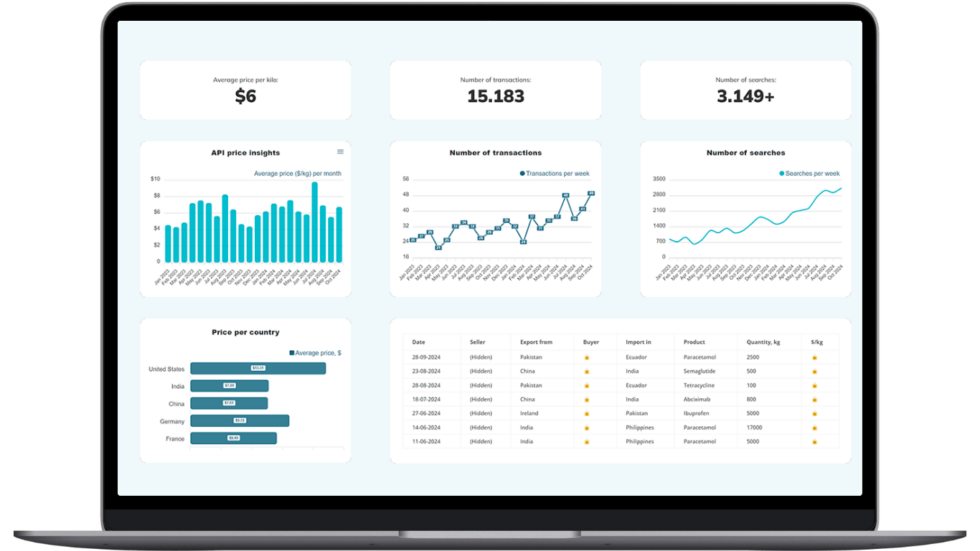
Ammar Badwy | Posted on November 4, 2021
How to find and contact API suppliers? 5 tips
There’s no denying that finding a supplier of Active Pharmaceutical Ingredients (APIs) can be somewhat of an expertise. You need to have a huge network, be legendary at Googling, or work with external services that help you. And can you even imagine sourcing APIs without having the Internet? I sure can’t.
To help you and your colleagues become pro at sourcing APIs, we came up with some top tips you can apply the next time you are looking for an API.
1. Embrace the internet
Traditionally, one of the most searched words on Google is actually the word “Google.” I’m trying to say that not everyone was born behind a computer like millennials are.
The better your search terms, the better the results will be. This goes for Google and other search engines like Baidu or Bing.
When your search terms are just the name of an API, let’s say salbutamol, you will likely only get information intended for end users and consumers. But if you start adding terms like “pharma”, “API,” “API supplier”, and “GMP” and use your new search query “salbutamol api suppliers with gmp”, you will only get results that are relevant to your sourcing process.
The quotation marks behind me aren’t just there for aesthetics, by the way! If you add those before and after your search terms, Google will look for exact matches only.
It can still be quite challenging to find the right results, though, which is also one of the reasons why we created Pharmaoffer. So anyone can easily access all available suppliers of APIs for free. You don’t have to spend your time manually searching anymore, as you can just search and filter according to your requirements with only a few mouse clicks. But enough promotion talk; let’s go to the next tip.
2. Use your words!
What would we be without proper communication? When sending your product inquiry, could you take the time to add some context to it? What is your company going to produce with the raw material? What qualifications are you looking for? What is the timeline? This is all incredibly valuable for the supplier to know!
But, of course, there needs to be a balance. I don’t think the supplier would be interested in hearing about the entire history of the company that you’ve copy/pasted from your website, but on the other hand, would like to know some more than just an “urgent quote please”! ;-).
The supplier will judge whether or not the inquiry is interesting based on the information you give them. So add information you think is most relevant; it’s not only the polite thing to do but also in your own interest.
As a bonus tip, why don’t you look at your received emails and check what questions you usually get back from suppliers? On your following inquiries, you can consider including one of those answers in advance and show the supplier how serious you are. Be careful not to give away your negotiation position by saying too much, though.
3. Make it personal
Even at work, we all have our favorites. Whether it is your favorite colleague, supplier, customer, or delivery guy, you’d go that extra mile just for them.
Don’t forget that on the other end of your screen is a human being with more interests than just business. Occasionally take some time for a chat, or make plans to meet in real life at business conferences such as the CPhI.
Of course, you should always stay sincere when building business relationships; only if there is a genuine click you should get personal with another. And then just chat about football, which I like, at least.
4. Do the research
These days, with the power of the Internet, you wouldn’t go to a hotel or restaurant without researching them. So also, in the business world, take some time to get to know the supplier first before you approach them.
You can find answers to at least a few questions by checking out their website or Pharmaoffer company page. For example, you can filter on what certificates they have and where they produce their APIs.
If you put in some effort to find out about the supplier, you will limit yourself to how many suppliers you will send your inquiry. Sometimes less is more, and the quality of your inquiry will indicate to the supplier how interesting it is for them.
In your inquiry, explain why you have chosen specifically for this supplier; that’s valuable information for them. You’d do the same at a job interview, wouldn’t you? So instead of going in blank and sending your inquiry to a dozen different suppliers, select just a few and research them.
5. Negotiation
Nobody wants to overpay for goods or services, of course. But is it good to start your conversation by asking for low prices? Don’t think so. The price is important, but it should be reasonable for both parties. It’s not fair to compare the price of a well-qualified European producer to a random producer you found on Alibaba; in the end, you get what you pay for. So be aware that quality can have its price.
As soon as the supplier notices that he’s dealing with a serious and reliable buyer, he will realize this could lead to a long and fruitful business relationship. It is in his own interest to give you a fair price since you both have to invest in this business relationship. Nobody wants to part ways after just one order, so make sure he understands you’re in this long-term and that you expect the right service for the right price.
Another thing that most suppliers won’t appreciate is backward negotiation. If you are looking for 25 kgs of an API, don’t tell them you need 500 first, only to reveal the actual amount you are looking for later. Be realistic and transparent, don’t tease the supplier by pretending you’re a bigger fish than you actually are.
To summarize
Now that you’ve heard our five tips, which were to use proper search terms, use your communication skills, make it personal, do research in advance, and learn what’s fair during a negotiation. Let’s make an example inquiry together that would get the attention of most pharmaceutical suppliers.
First, we do the research and pick one or two suppliers that match our request. Second, we tell them a bit about our company and what we do. Third, we give details on the inquiry, what we are looking for specifically, and the context behind our project. Fourth and final, we keep it fair and to the point and wait for the supplier to respond.
“We are a compounding pharmacy from Belgium and have a GMP-certified production site near Brussels, we started in 2014.
We are looking for 25 kg of salbutamol sulfate in EP quality for a new project to produce tablets. Can you give me information about the particle size distribution?
We do not have a supplier yet for this API and are interested in receiving your price quotation; the end market for our production is Belgium and Luxembourg.”
Well, actually… they might need a reminder in a couple of days, though. After all, it IS the pharmaceutical industry we’re dealing with here.

Make Smarter API Decisions with Data
Access exclusive insights on global API pricing, export/import transactions, competitor activities and market intelligence.







Check out all other blogs here!